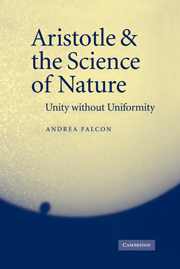3 - Motions
Published online by Cambridge University Press: 22 September 2009
Summary
Both Leucippus and Democritus speak of the primary bodies as always moving in the infinite void; they ought to say with what motion and what is their natural motion
(Aristotle, DC 300 b 8–10).NATURAL AND NON-NATURAL MOTIONS
The student of nature assumes the reality of the natural world and conceives it as a certain arrangement of natural bodies. Within the broad compass of natural bodies is found a remarkable array of bodies. They range from the living celestial bodies performing a circular motion around the earth, to the living sublunary bodies endowed with the capacity for poreia and displaying the maximum degree of bodily complexity (perfect bodies), to the stationary living sublunary bodies (inferior animals and plants), and finally to the inanimate sublunary bodies. The student of nature is concerned with all these bodies on the assumption that they are either simple or composite bodies. Composite natural bodies are themselves composed of natural bodies. Earth, water, air, and fire are the sublunary simple bodies. They are the ultimate material principles of all the bodies that we encounter in the sublunary world, including the artificial bodies.
All these bodies are liable to undergo motion from one place to another. Consider the case of a stone: if dropped from a hand, a stone falls downwards. But why? Aristotle's view is that a stone is composed of earth, water, air, and fire in a certain ratio, and earth so predominates as to impart its own natural downward motion to the stone.
- Type
- Chapter
- Information
- Aristotle and the Science of NatureUnity without Uniformity, pp. 55 - 84Publisher: Cambridge University PressPrint publication year: 2005



